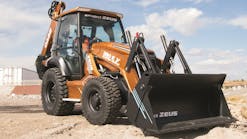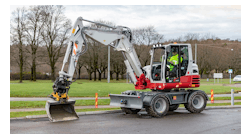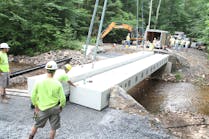The months are now mere weeks until the Presidential Election. The first of the Presidential debates was just held. This election season has elicited a lot of discussion on immigration, national security, and foreign policy, among other things. None of those will be put under scrutiny here. But I will push into the spotlight the issue of the nation’s infrastructure. Grading & Excavation Contractor magazine has been actively promoting and advocating for infrastructure investment for a number of years.
I’m not going to give you a detailed analysis of where each Presidential Candidate stands on the issue of infrastructure—mainly because the Association of Equipment Manufacturers (AEM) has already done a quite robust comparison. But before I get into that, the AEM has also produced a couple of videos promoting the importance of infrastructure this election season. The first video mimics the language Donald Trump has used on the campaign trail, while the second mirrors Hillary Clinton’s language used on the same issue.
A la Donald Trump:
“Restore American Greatness: Rebuild Our Roads and Bridges”
A la Hillary Clinton:
“Rebuild Infrastructure and Rebuild the Middle Class!”
The AEM’s advocacy website, I Make America has created a very helpful resource that you may want to consider before casting your vote for either Hillary Clinton or Donald Trump this November. It includes a comparison on where the candidates stand on important industry issues and goes as far as comparing them for the presidential contest, as well as some of the battleground states.
For example, you’ll see this on the issue of Transportation Infrastructure Investment:
Trump (R):
Trump has pledged to rebuild America’s infrastructure, and spend far more money on infrastructure than the United States has in recent years. “Our airports, bridges, water tunnels, power grids, rail systems—our nation’s entire infrastructure is crumbling, and we aren’t doing anything about it,” Trump wrote in his campaign book.
Trump has not detailed how he would finance a dramatic expansion in infrastructure spending. Trump has indicated that he may redirect funding for military engagements overseas or foreign aid to domestic infrastructure spending.
Trump has also argued that he might be able to uniquely bring down the costs of infrastructure projects. “It will be done on time, on budget, way below costs, way below what anyone ever thought. I look at these roads being built all over the country and I say, ‘I could build these things for one third,’” he said.
Clinton (D):
Clinton supports increasing infrastructure investment, and has released a detailed plan explaining how she would propose to achieve her goal.
Clinton proposes a five-year, $275 billion infrastructure plan, $250 billion of which would be spent directly on projects. She proposes using the remaining $25 billion to capitalize a national infrastructure bank. Clinton says this bank could use its seed money to support as much as an additional $225 billion in direct loans, loan guarantees, and other forms of credit enhancement, which she says would result in a total of $500 billion in total, federally supported infrastructure investment.
Clinton’s infrastructure plan would be guided by several core objectives: Reducing congestion and easing the cost of vehicle repairs due to shoddy roads; expanding public transportation; addressing freight bottlenecks; expediting commercial and freight aviation; expanding access to high-speed internet; and building next-generation energy and utility infrastructure. Equipment manufacturers support robust investments in our surface transportation infrastructure to help create manufacturing jobs and support a modern and efficient commerce system. Equipment manufacturers support adjusting the gas tax—also known as the user fee—to sustainably finance the Highway Trust Fund while policy-makers explore new alternatives to adequately fund the next generation of infrastructure investment. AEM recognizes the important role the federal government plays in supporting our national infrastructure, and opposes devolving the program to the states.
Inform yourselves, and please vote on Election Day.








